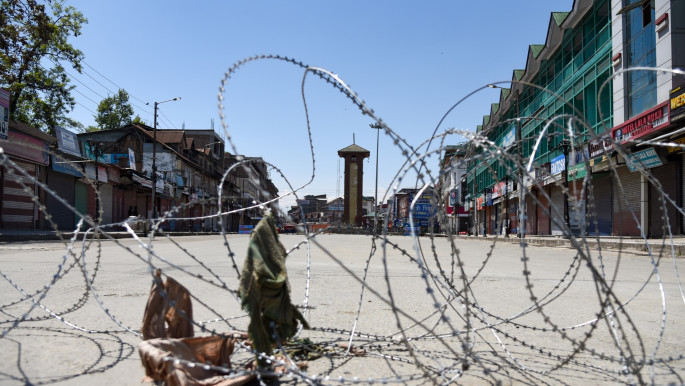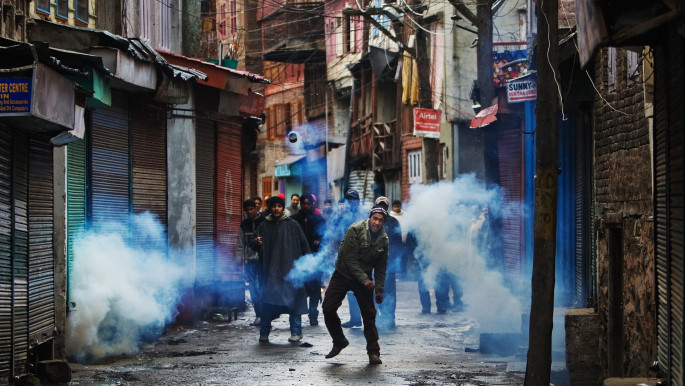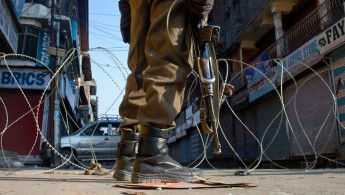India's new media policy tightens the noose on Kashmiri journalists
Besides empowering authorities to decide what is "fake", "unethical" or "anti-national" content, the 50-page policy, which will remain in effect for the next five years, allows government officials to take legal action against journalists and media organisations. Media outlets who violate the new rules will also be delisted and lose government advertisements.
"J&K has significant law and order and security considerations, it has been fighting a proxy war supported and abetted from across the border," the policy document, released on 2 June, said. "In such a situation, it is extremely important that the efforts of anti-social and anti-national elements to disturb peace are thwarted."
The new media policy makes it compulsory to check the background of newspaper publishers, editors and key staff before enlisting them for government advertisements. Background checks are also now mandatory before granting accreditation to journalists.
"There shall be no release of advertisements to any media which incite or tends to incite violence, question the sovereignty and the integrity of India or violate the accepted norms of public decency and behaviour," the policy says.
 |
The new policy empowers authorities to decide what is 'fake', 'unethical' or 'anti-national' content |  |
The Directorate of Information and Publication Relations (DIPR) will "examine" content of print, electronic and other forms of media for "fake news, unethical and anti-national activities." The DIPR has also been entrusted to "devise a suitable coordination and information sharing mechanism with the security agencies".
The policy document justifies the new measures by striving to create a "sustained narrative on the functioning of the government in media" and promote the "highest standard of journalism."
 |
|
| Read more: India's draconian internet shutdown hinders Kashmir's battle against Covid-19 |
Critics have expressed outrage over the new laws, calling the media policy an attempt to strangle the press and comparing it to "a remnant of the colonial-era".
"Besides the continuous ban on high-speed internet that has stifled journalism in Kashmir, there is enormous state pressure on media," independent Kashmiri journalist Mohmmad Iqbal (not his real name) told The New Arab.
"Every now and then journalists are being booked under laws, thrashed while performing their professional duties, summoned and questioned by police. The new media policy is clearly an attempt to further tighten the grip on media in Kashmir."
Reporters Without Borders (RSF) said it was appalled by the new "Orwellian press policy", calling for its immediate withdrawal.
"As there is no definition of what constitutes fake news or anti-national content, the government has absolutely infinite interpretative leeway to censor any journalism it does not like and to impose its own narrative," the group said.
Violence against journalists has escalated since August last year, when New Delhi stripped Muslim-majority Kashmir of its semi-autonomous status and put the disputed territory under lockdown. Dozens of journalists have been assaulted by security forces, while others have been summoned for questioning over their reporting.
 |
The government has absolutely infinite interpretative leeway to censor any journalism it does not like and to impose its own narrative |  |
In April this year, photojournalist Masrat Zahra and journalist-author Gowhar Geelani were summoned under anti-terror laws for social media posts by Kashmir's Cyber Police. Geelani was charged with "glorifying terrorism in Kashmir" through social media posts, while Zahra was accused of publishing "anti-national" posts. Both journalists deny the allegations. In the same month, police also summoned the Srinagar-based correspondent of English national daily The Hindu, Peerzada Ashiq, over a news report.
"We have questioned only one journalist over his work," Inspector General of Kashmir's police Vijay Kumar told local media. "The other two persons - Zahra and Geelani - have not been booked for any of their journalistic work but because of the reason that they have posted explicitly seditious, incendiary and incriminating texts on social media, challenging sovereignty and integrity of India and attempting to instigate people for violence."
 |
|
| Read more: 'Palestine in the making': India's new Kashmir domicile law mirrors Israel's settler-colonial blueprint |
In May, meanwhile, editor of local news portal The Kashmir Walla, Fahad Shah, was summoned by police over a report on a gunfight that broke out between armed rebels and Indian armed forces in Srinagar, the region's main city. The gunfight left two armed rebels dead, with more than 12 houses completely or partially damaged.
In April, after the coronavirus pandemic hit the disputed Kashmir valley, the Directorate of Health Services circulated an intimidating message threatening public servants and doctors with "strict action" if they criticised the government's efforts to combat the virus on social media, or to the press.
"Any person disobeying any regulation or order made under the Epidemics Diseases Act, 1897 shall be deemed to have committed an offence punishable under Section 188 of the Indian Penal Code [IPC] (45 of 1860)," the order said.
Despite the constant intimidation and threats journalists face in Kashmir, many have recently been recognised for their extraordinary work within a hostile reporting environment. On 11 June, Zahra, who was charged under anti-terror laws, was named the winner of the 2020 Anja Niedringhaus Courage in Photojournalism Award.
"Zahra would often observe clashes between Indian security forces and Kashmiri protesters," the award citation reads. "Defying the wishes of her family, Zahra became a photojournalist in order to join Kashmiri journalists working tirelessly to cover the Indian occupation of the region and its toll on local communities."
In May, three Kashmir-based photojournalists with the Associated Press - Dar Yasin and Mukhtar Khan based in Srinagar and Channi Anand based in Jammu - won the prestigious Pulitzer Prize for their coverage of Kashmir's lockdown after Indian revoked Article 370 last year.
Months earlier, freelance journalist Ahmer Khan was announced as the winner of the 2019 Agence France-Presse(AFP) Kate Webb Prize for his ground reports from Jammu and Kashmir after India rescinded the region's special status.
Follow him on Twitter: @Aamirbhatt3



